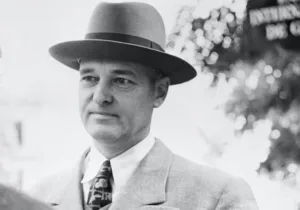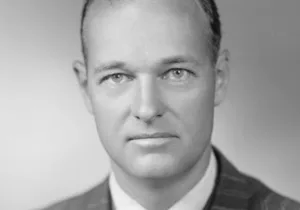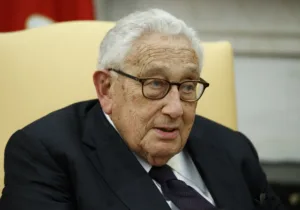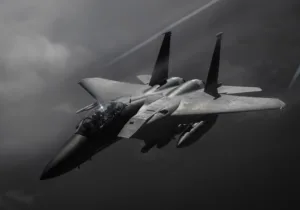Tooley: Hello this is Mark Tooley, editor of Providence: A Journal of Christianity & American Foreign Policy, with the pleasure today of speaking with my friend, John Wilsey, professor at Southern Baptist Theological Seminary in Louisville, Kentucky and biographer of John Foster Dulles. His new book is recently released. It’s a spiritual biography of a decisive Cold War figure who was Secretary of State under President Eisenhower. So, John, thank you for your magnificent scholarship on John Foster Dulles.
Wilsey: Thank you very much, Mark. I appreciate it.
Tooley: So, why should Americans and Christians care about John Foster Dulles, who died 60 years ago?
Wilsey: Well, John Foster Dulles, his approach to foreign policy was deeply influential after his death. That lived on well after his death. Dulles had a vision of American foreign policy that was animated by a strong sense of righteousness over tyranny and over injustice and unrighteous. He believed that nations were answerable to God’s moral law and America was called to be a paragon of the moral law, which is seen, you don’t need scripture to have it. His understanding of moral law is not a real developed kind of theological philosophy. It’s sort of a common-sense way to think about maybe what we would say natural law, right. It’s a little bit different than natural law. It’s not like the natural law tradition in the Catholic tradition or anything like that. It’s more the moral law and the Protestant liberal understanding, sort of going back to Christ’s ethical teaching, let your light shine before men that they may see your good works and glorify your father in heaven, do unto others as you would have them do unto you. The United States, being a Christian nation, being a nation with a God given destiny to preserve, to defend, and extend freedom in the world over and against those nations that tyrannize their people and seek to tyrannize other people. United States is the champion of freedom in the world. So, that kind of a vision that Dulles advanced in the ‘50s, in the early days of the Cold War, was influential later on and in subsequent administrations really going all the way through today. People still have the assumption that the United States has a responsibility, has a duty, to protect the interests of free humanity all over the world, because pragmatically speaking, we have the power to do that, we have the means to do that. But we also have a special responsibility to do that as an American exceptionalism, first country founded upon the ideals of human freedom, human dignity, natural rights, human equality, and these kinds of things. So, these are all consistent with what Dulles thought in his approach to foreign policy. And even though most people don’t know who John Foster Dulles was and weren’t around, don’t remember him, some people were. They are still going to be quite a few people that would remember him and remember his leadership in the State Department. But even though he’s gone and has been gone for a long time and is somewhat forgotten, his legacy in American history and his legacy handed down to us today is enduring.
Tooley: The way you describe Dulles’s beliefs about God and country, he would almost in today’s lingo be labeled a Christian nationalist, yeah?
Wilsey: He might be. And that is an interesting thing that Dulles introduces an interesting dynamic in how we think about a Christian nation. Christian nationalism as a concept in contemporary discourse and the context of Trump, especially the Proud Boys and the assault on the Capitol and those kinds of things, we think about as a right-wing thing today. And that’s probably accurate. Since the ‘70s, Christian nationalism has been sort of a tenant of the right wing, especially right-wing evangelicalism, people like David Barton, people like John Eidsmoe, people like D. James Kennedy, or Jerry Falwell. People like that. But Christian nationalism, for one thing, has always existed in American history in some form or fashion. and Christian nationalism usually takes its form kind of around the contours of the immediate historical context. So, in other places, I’ve argued that John Louis O’Sullivan’s manifest destiny in the 1840s and ‘50s was a form of Christian nationalism, but very different than that which we see today. Well, Dulles represents a form of Christian nationalism that was prominent in his lifetime, but that Christian nationalism that Dulles sort of represents originated on the left, especially during the progressive period with the Theodore Roosevelt Administration, Woodrow Wilson’s Administration, the First World War. And American involvement in World War I was seen by progressives as an opportunity to Christianize the world, to extend Christian civilization all over the world. And Dulles was a student of Woodrow Wilson when he was at Princeton. He took Wilson’s jurisprudence class when he was I think a junior at Princeton. He looked up to Wilson. He was a devotee of Wilson’s foreign policy. And he also got to know Wilson pretty closely, because Dulles was at Versailles and served on the Reparation Commission at Versailles. And so, he had several interactions with Wilson in his role at the Reparation Commission, and for all of his life, he deeply admired Wilson and bought into Wilson’s sort of internationalist vision. But also, the vision of America being something of a messianic nation.
Tooley: And Dulles came out of the liberal mainline Presbyterian church, yes? And was very active in his denomination and was also an official at the Federal Council of Churches, which was a precursor to the National Council of Churches. So, he was the embodiment of liberal mainline Protestantism, and obviously his ethos and beliefs emerged from that. His personal beliefs, his personal faith, do we know what his personal theology actually was?
Wilsey: Yeah, we definitely do. We definitely know it. So, he grew up as a pastor’s kid. He was a pk. He was born in 1888 in Washington, DC. He spent all of his childhood in Watertown, New York, which is a little bit north of Syracuse on the Ontario shore. His father, Allen Macy Dulles, was the pastor of the First Presbyterian Church of Watertown, New York and was pastor there for 17 years after until 1904. And that was also the year that Foster went to college. He went to Princeton in 1904. And so, he was brought up in the Presbyterian tradition, but the modernist, in the modernist tradition, his father was a modernist or a liberal in that day. And we see Dulles was not a theological thinker. He wasn’t someone that was an abstract thinker. He was a pragmatic thinker. But Dulles, his view of Christianity, he saw Christianity not as a dogmatic faith, he didn’t see Christianity as rooted in ideas as much as it was rooted in practice, particularly ethical practice. He saw Christianity as an operational faith, less than an intellectual or a dogmatic thing. And I think that’s because he was brought up in that liberal tradition that stressed, had a very strong stress, on the Christian ethic over and above doctrines like the virgin birth or the substitutionary atonement, or the physical return of Christ, the last days. And we see that his emphasis was on ethics, especially during his involvement in the Presbyterian controversy with fundamentalists in 1924-1926. So, we do know a lot about his beliefs. One other thing I’ll say about that is Dulles was an outdoorsman. He was a fisherman, but he was particularly a sailor, and he owned an island out in the middle of Lake Ontario. And one thing we see Dulles do all the time is that he sees nature, the natural world, in almost like a sacramental sort of a sense. God reveals himself in the rhythms and the wonders of nature. And he’ll find a lot of moral and spiritual wisdom, ethical wisdom that he sees with his experience in nature, he’ll apply to challenges that one faces in foreign policy. So, that’s another example of how he sees the power of the moral law that God created. The universe is a moral. We don’t just see morality and human interactions or an abstract philosophy or thought, we see moral principles play out in the world around us.
Tooley: And Dulles, as a Christian, believed strongly in the deployment of American force in defense of American interest and in defense of a wider peace. He sort of endorsed the nuclear blast at Hiroshima and Nagasaki, if I recall correctly, in terms of being an official with the Federal Council of Churches. And obviously during the Eisenhower Administration, the new policy of was it called “massive retaliation,” which relied heavily on nuclear weapons. At the same time, obviously, he believed in restraints. And I recall his response to someone urging a preemptive war against the Soviet Union, and his response quite strongly insisted that he and President Eisenhower would reject that proposal for moral reasons. So, he seemed to have a fairly subtle understanding of Christian ethics and force. Is that accurate to say?
Wilsey: I think that’s very good. I think that’s right, exactly right. Dulles had a very developed view of security. So, I think that would be a word that might be more appropriate than force. Massive retaliation, brinksmanship, new look, which was kind of the common title or kind of the term for Eisenhower’s approach to foreign policy. And new look, which is closely associated with what was commonly called massive retaliation, Dulles did not use that as a term to describe his position. That was a term used, I believe, by James Reston, who was a correspondent with Life magazine if I’m not mistaken. But massive retaliation, new look, the way that we can understand this is really deterrence. So, another way we might understand it too is in another historical figure in Reagan’s two terms. When he was president, he made a great deal of deterrence force or “peace through strength,” right. This was sort of the thing he stressed a lot when he was president. Reagan’s approach to foreign policy, building up the military, having a 600-ship navy, sort of balancing out the nuclear deterrent, and having Strategic Defense Initiative and these things, these were all for deterrence, these were not for preemptive war. These were not for first strike capability. They were to deter the Soviets from ever launching some kind of attack somewhere. Well, that was Dulles’s view almost exactly. Dulles wanted to have security that was based upon collective defense through alliance systems that would isolate the Soviet Union, and later communist China, the communist world. And massive retaliation was sort of predicated on the idea that if the communists can’t claim ignorance. If they were ever to launch a strike somewhere, that the United States and its allies would be able to retaliate massively in ways of its own. Choosing places of its own, choosing timing of its own. The Soviet Union could not claim ignorance about what the United States might do. Rather than the Soviet Union would know exactly what the United States was going to do, that they were going to retaliate massively in ways of their own choosing. And the way that it would do that would be through the security arrangements. So, arrangements like SEATO, NATO, CENTO, ANZUS. These alliance systems that were all over the world, they were meant to isolate and give them pause, as it were, before they launched a strike.
Tooley: And then finally, John, John Foster Dulles sort of embodies the ability of the old mainline Protestant world to produce this kind of a statesman who’s not a theologian, obviously, but still has a very subtle Christian understanding of statecraft and national security. Does today’s American Christianity have that same ability to produce such a subtle statesman?
Wilsey: Not in the same way they did. Dulles is interesting because he’s sort of among the last of the WASP officials in the government. They dominated the government. Once you get to the Carter Administration, you begin to see a lot more diversity in the higher echelons of the federal government, which I think is a good thing. But what you have in the ‘50s, and what Dulles represents, is sort of that old kind of establishment Protestant, certainly white, male, and wealthy sort of demographic that dominates the American government all the way back to the founding. In terms of the religious aspect of Dulles’s frame of reference, he was unique even for his own day. It’s true that most people back in those days, in the ’50s, would have been something like Protestant, Catholic, Jew. Will Herberg’s sort of perspective on American religious life. And we have a much more diverse religious culture today. But yeah, even though he was part of that, he was still unique because religion played a more significant role in his frame of reference than it did for others of his day. I think about someone like Dean Acheson or someone like George Kennan, I mean, these were people that were protestants, but religion did not play a significant role in their way that they responded to foreign policy challenges. So, Dulles was pretty unique for his day.
Tooley: John, do you have a copy of the book you could hold up?
Wilsey: I do. Here’s the book.
Tooley: God’s Cold Warrior by John Wilsey of Southern Baptist Theological Seminary. Thank you, John, for a very educational interview.
Wilsey: Thank you very much, Mark. I appreciate it.







 Sponsor a student for Christianity & National Security 2024
Sponsor a student for Christianity & National Security 2024